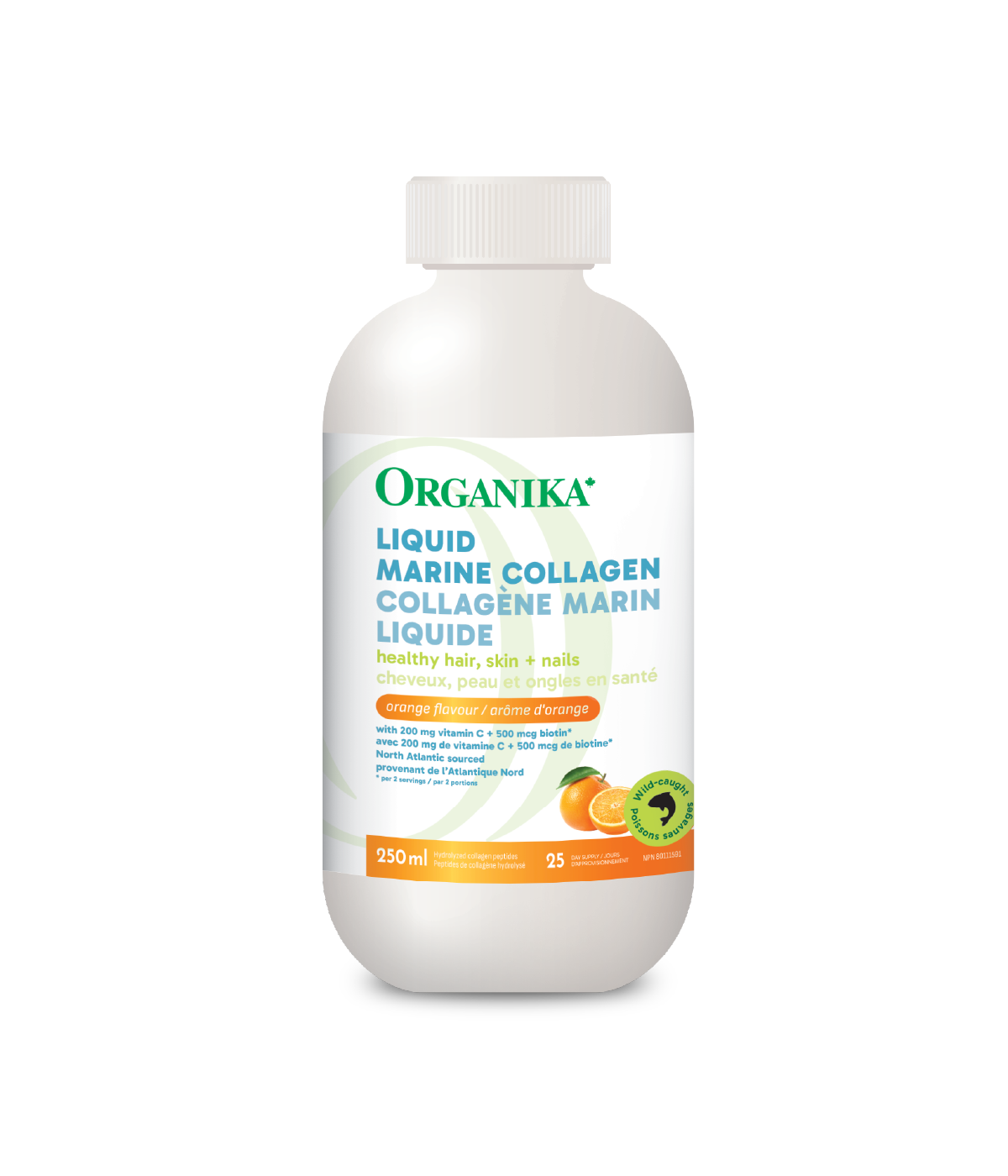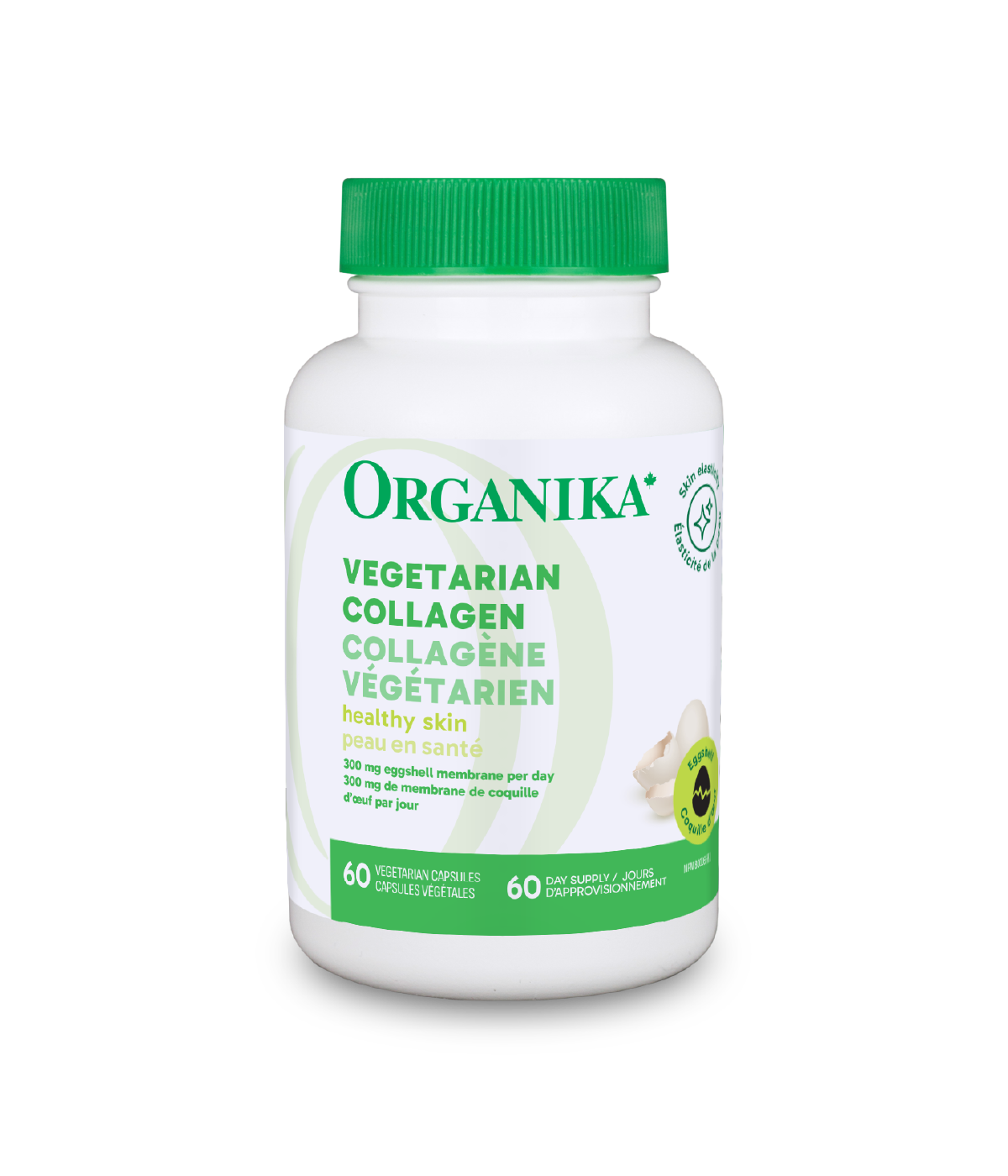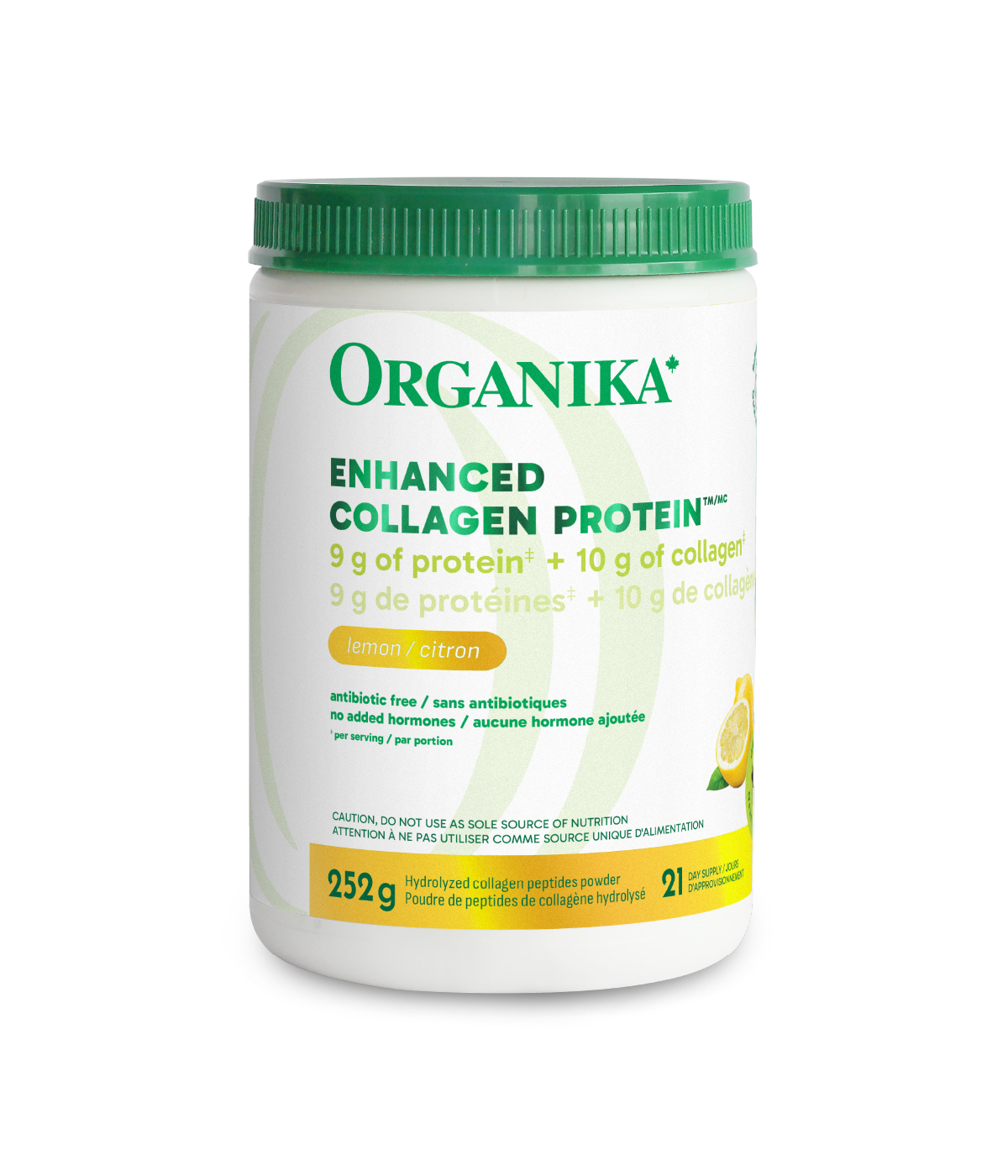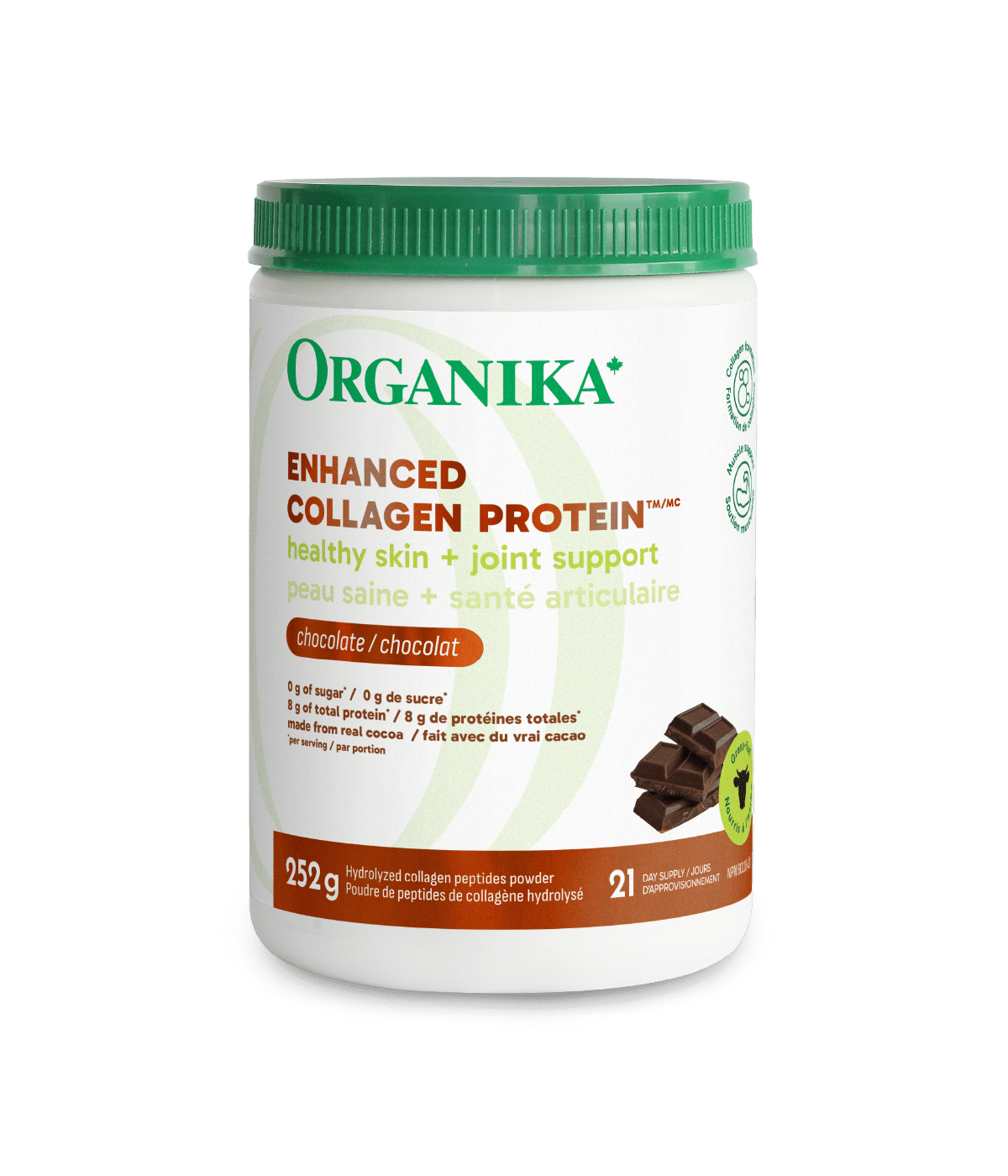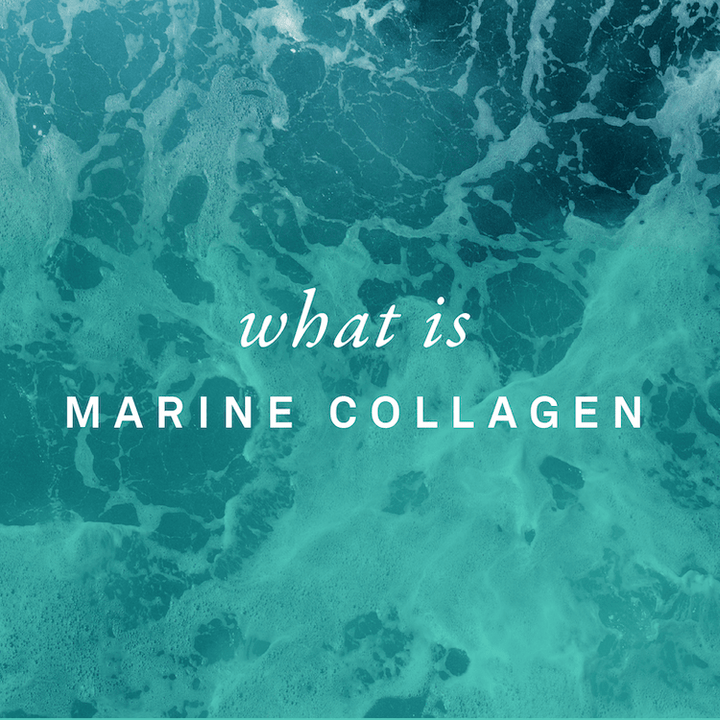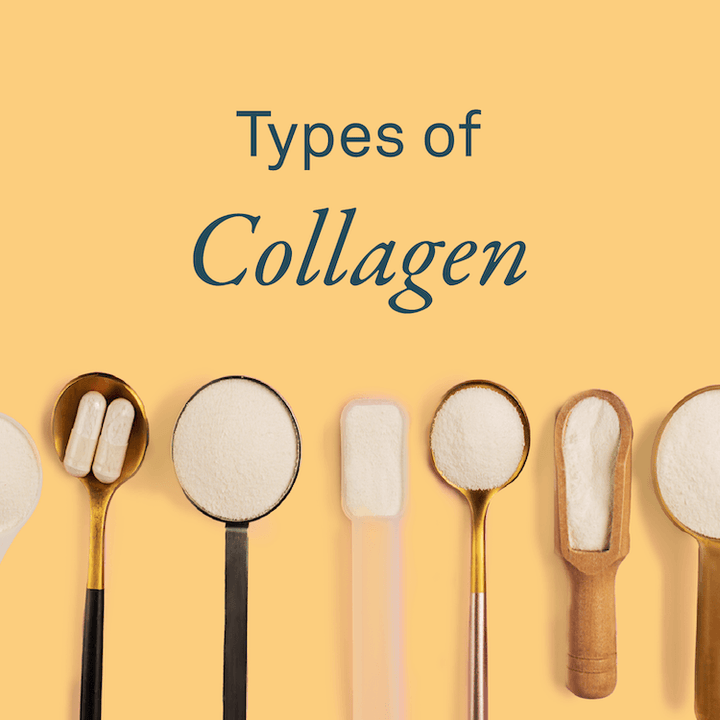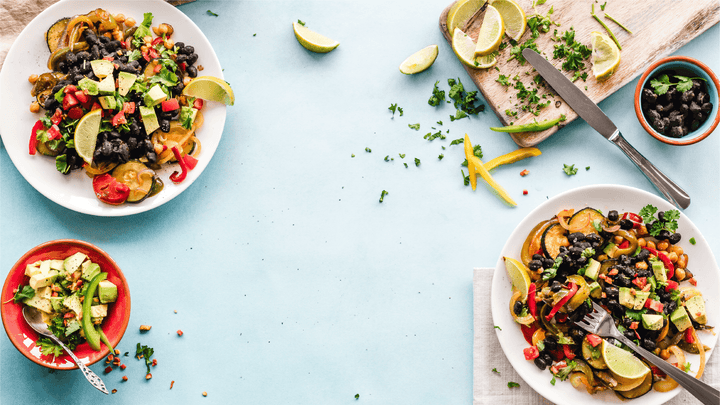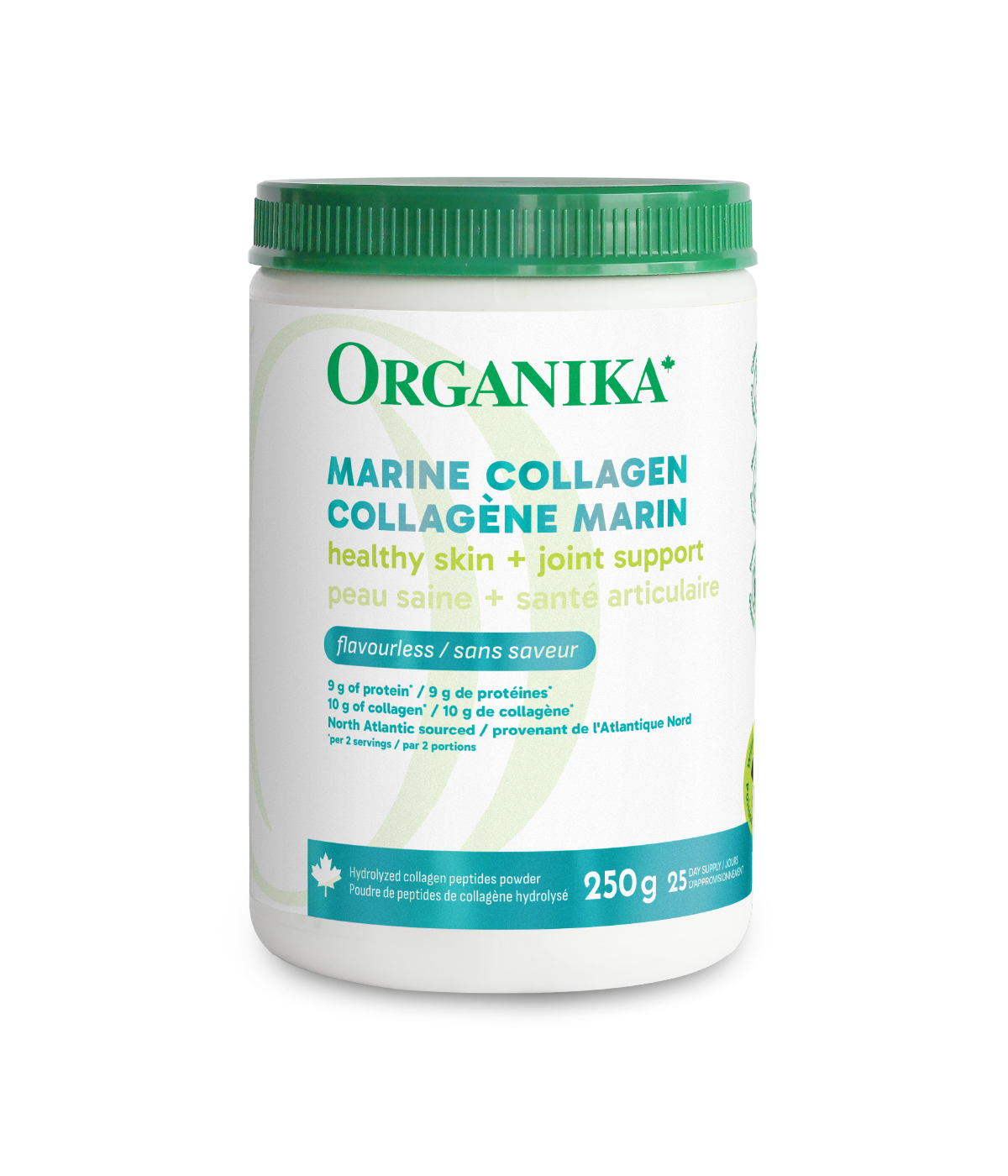
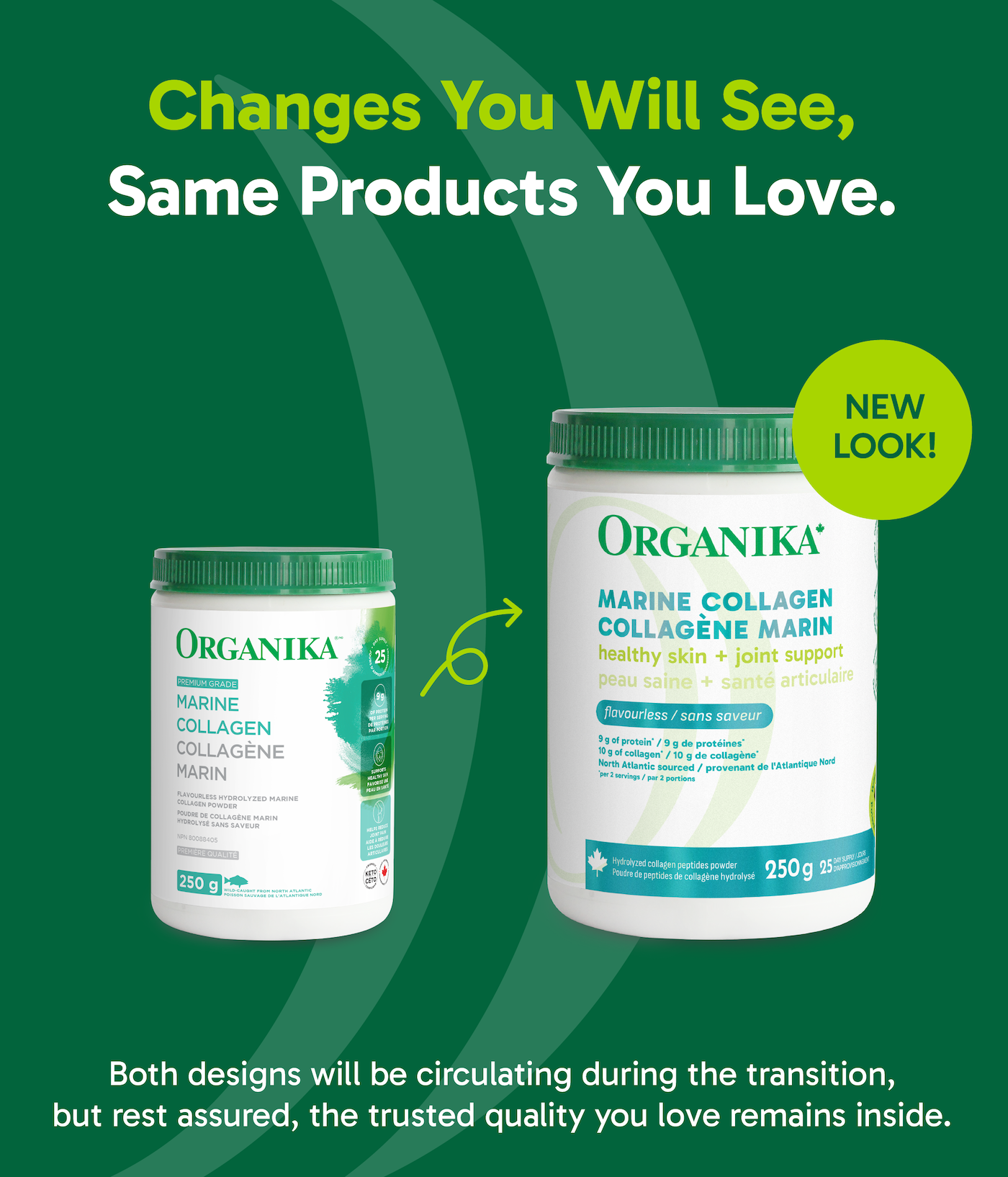
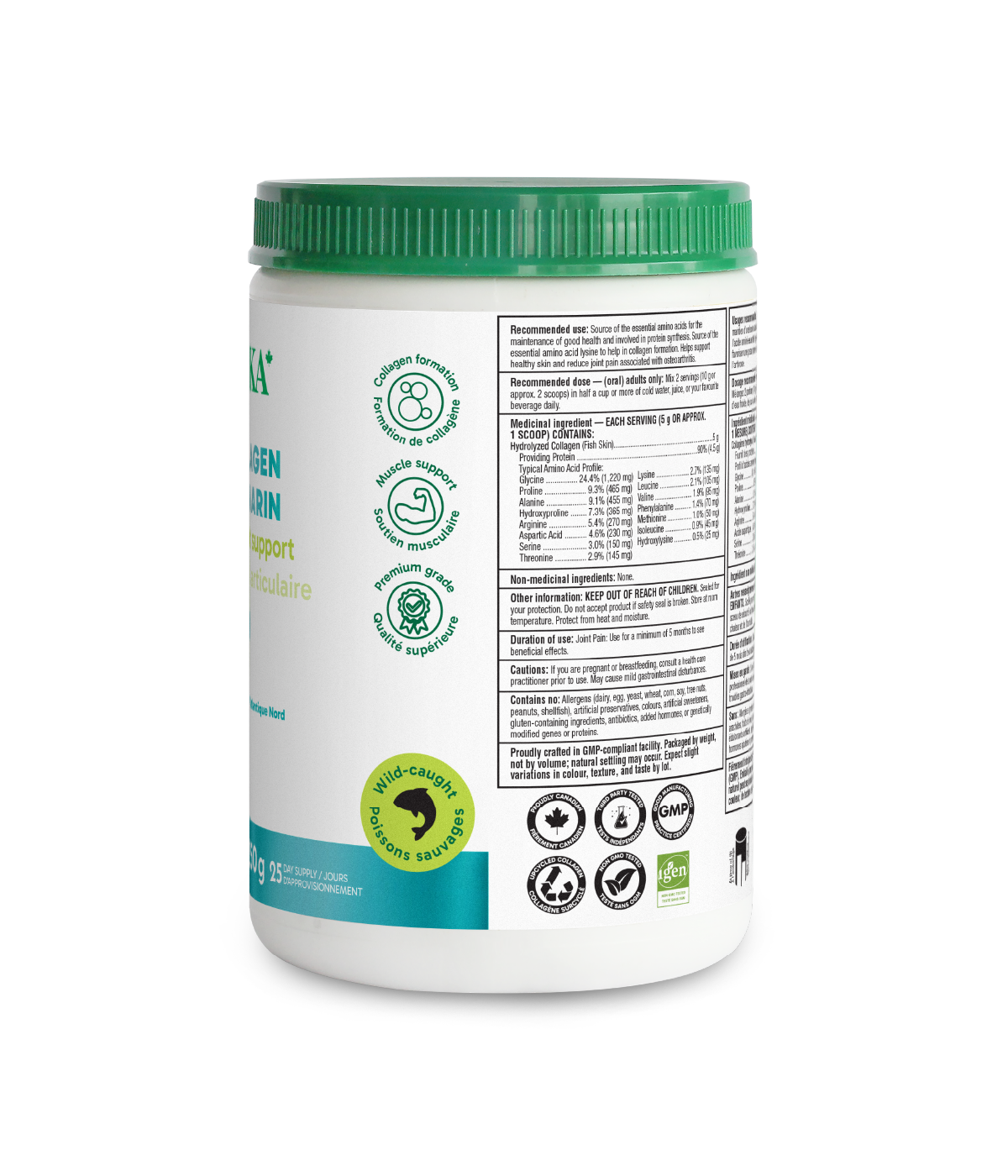
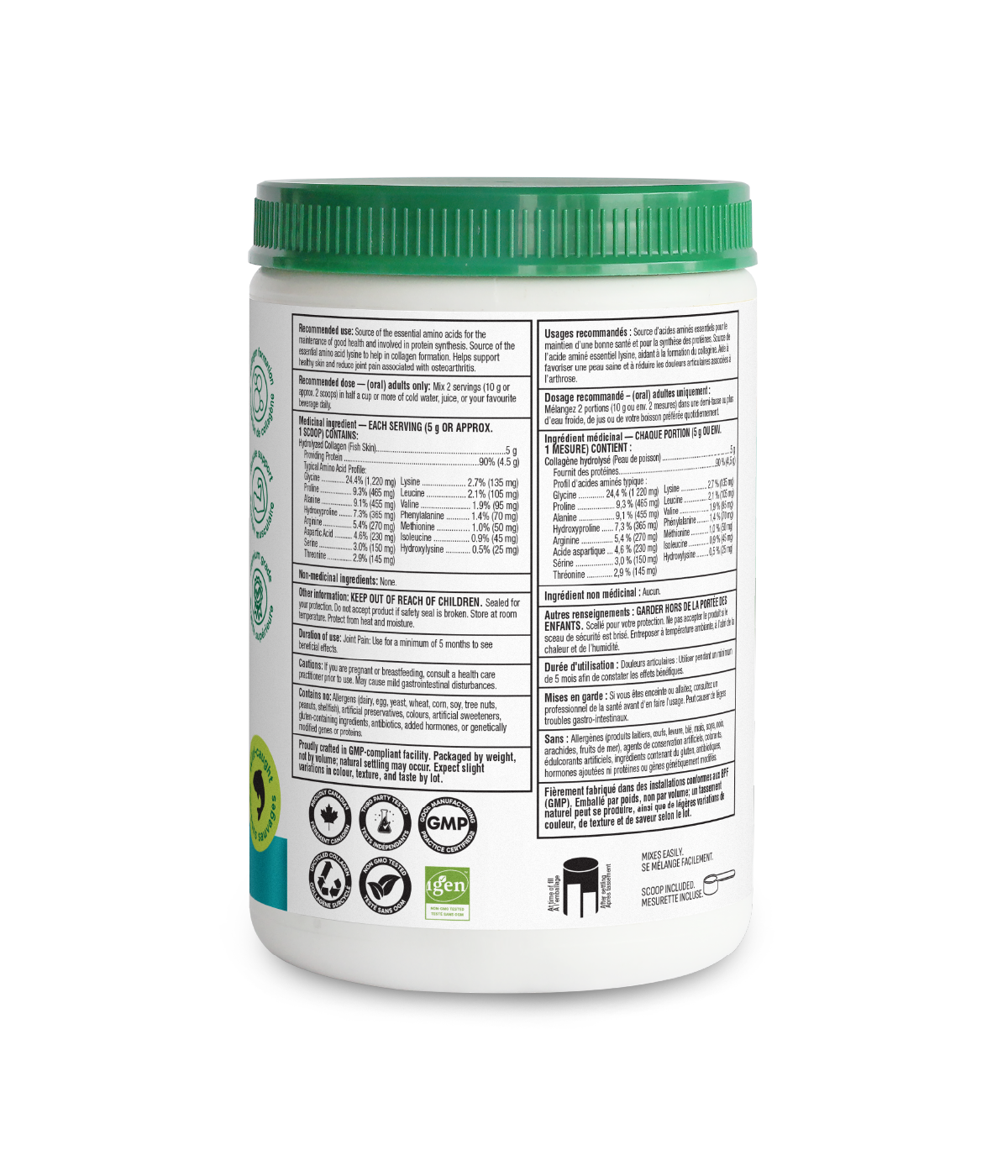
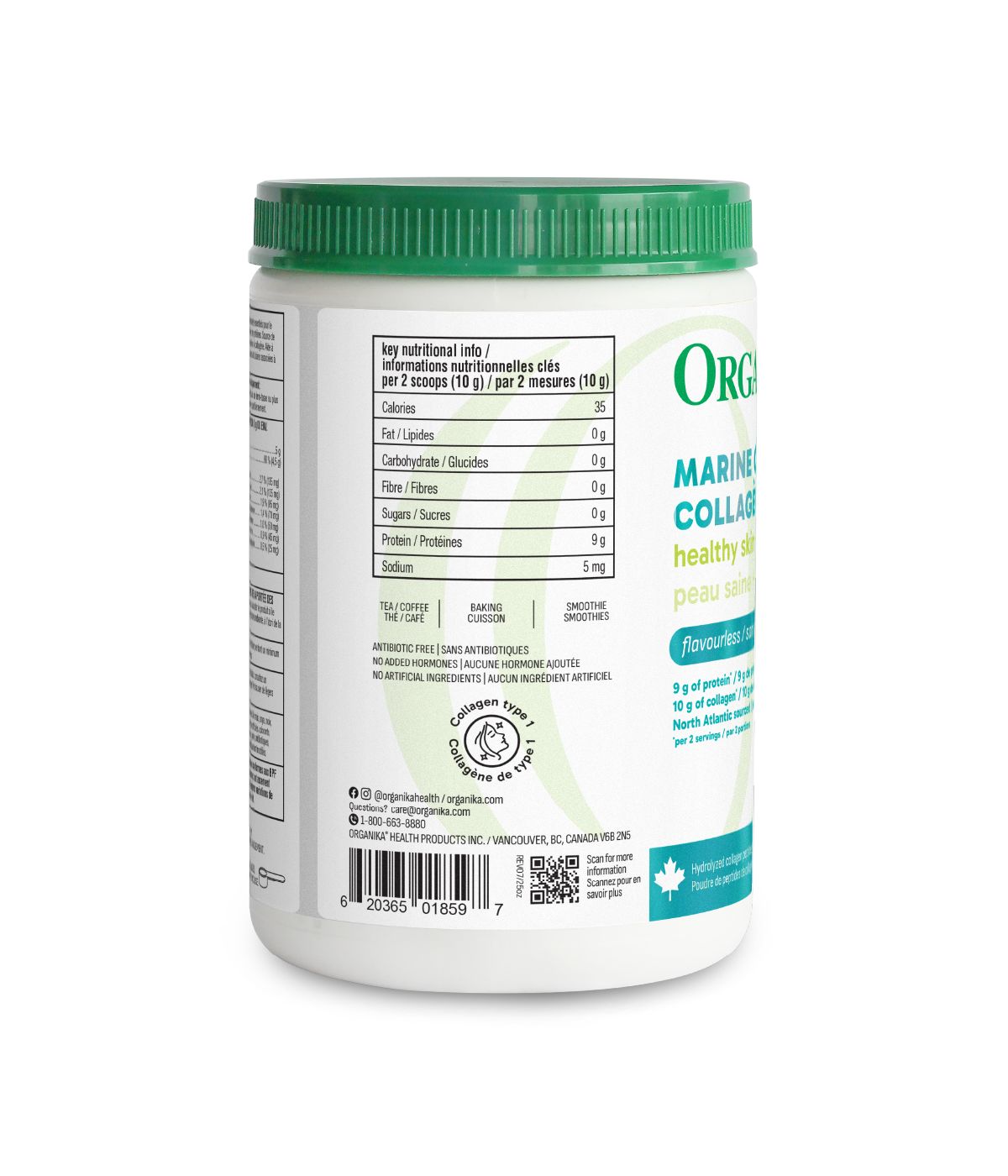
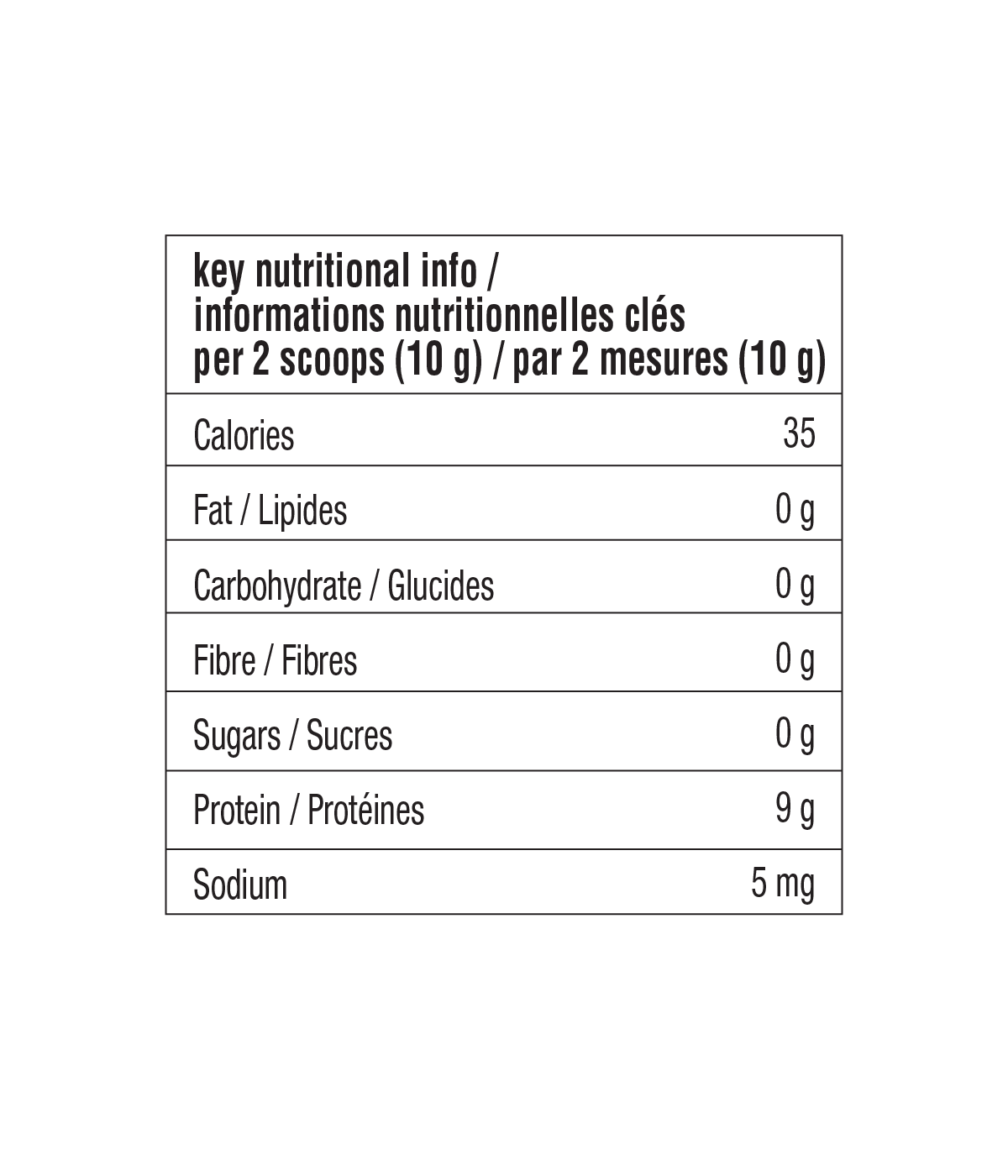
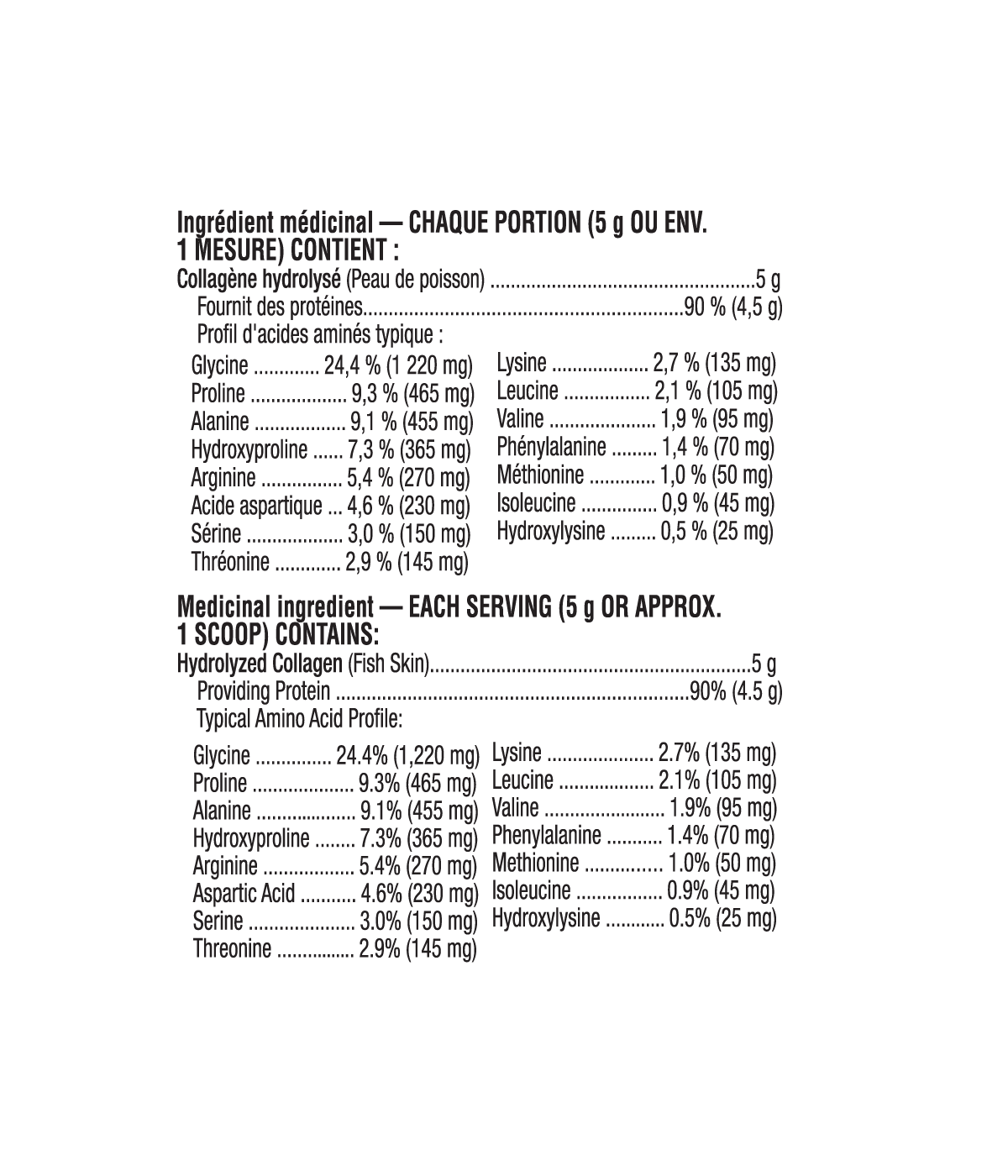




-
Is this right for you?

-


-


-

-

-

-

-

-

Marine Collagen Powder
An ocean-based alternative to bovine collagen esepcially key for healthy skin, hair and nails
- Promotes healthy skin, hair, and nails
- 9 g of protein per serving
- Helps reduce joint pain linked to osteoarthritis
- Helps maintain healthy joints
Couldn't load pickup availability



Notify Me When Available
Enter your email and we'll let you know as soon as this product is back
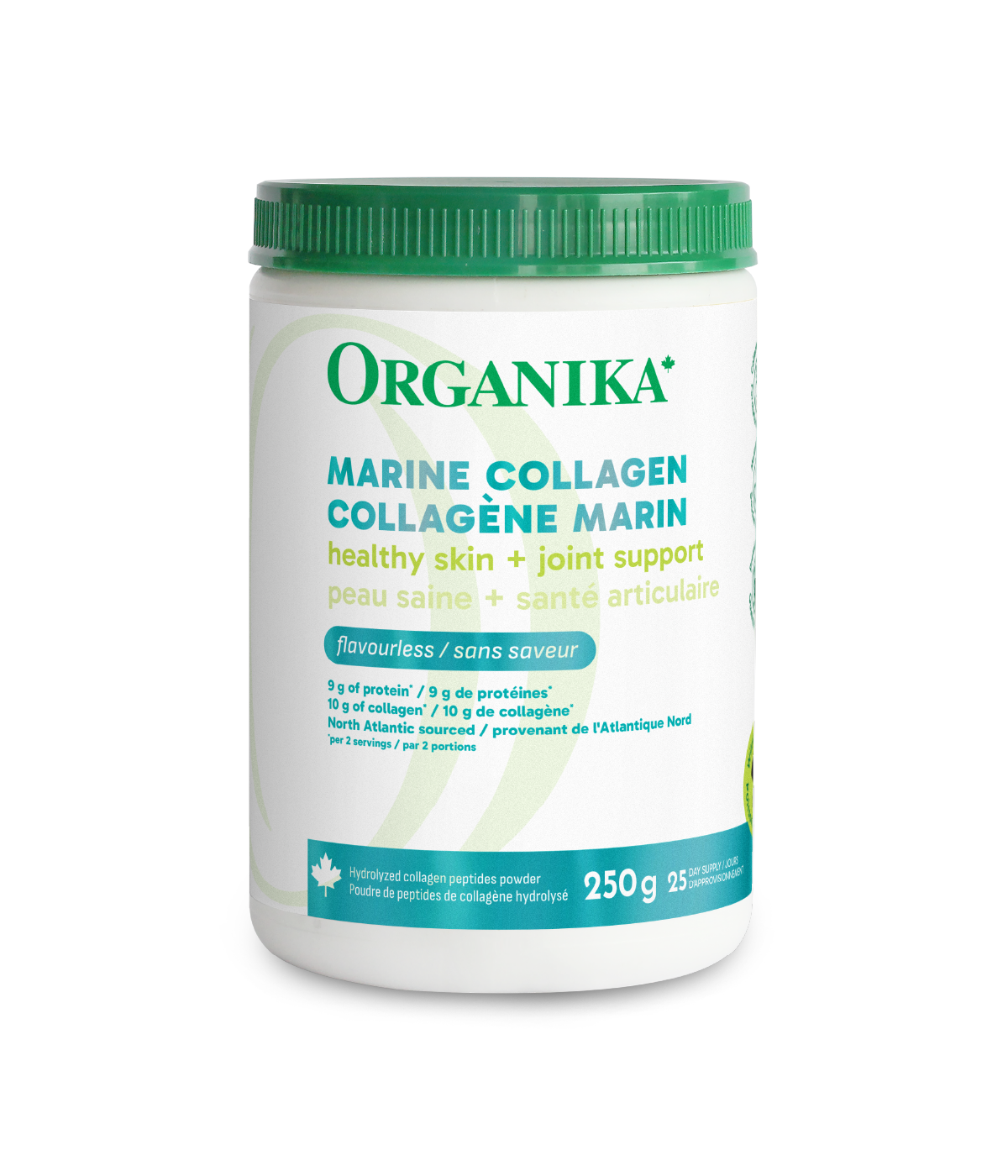
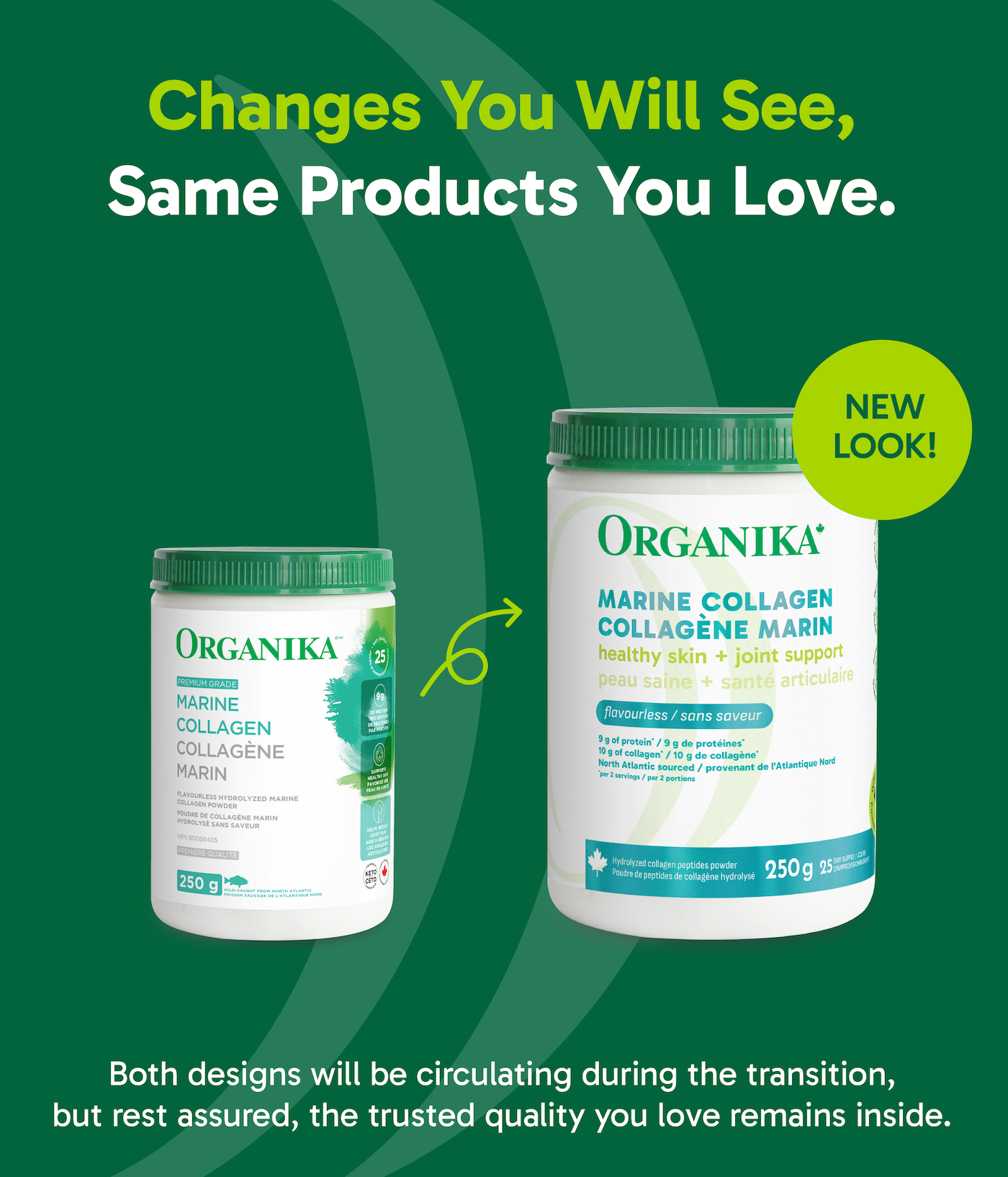
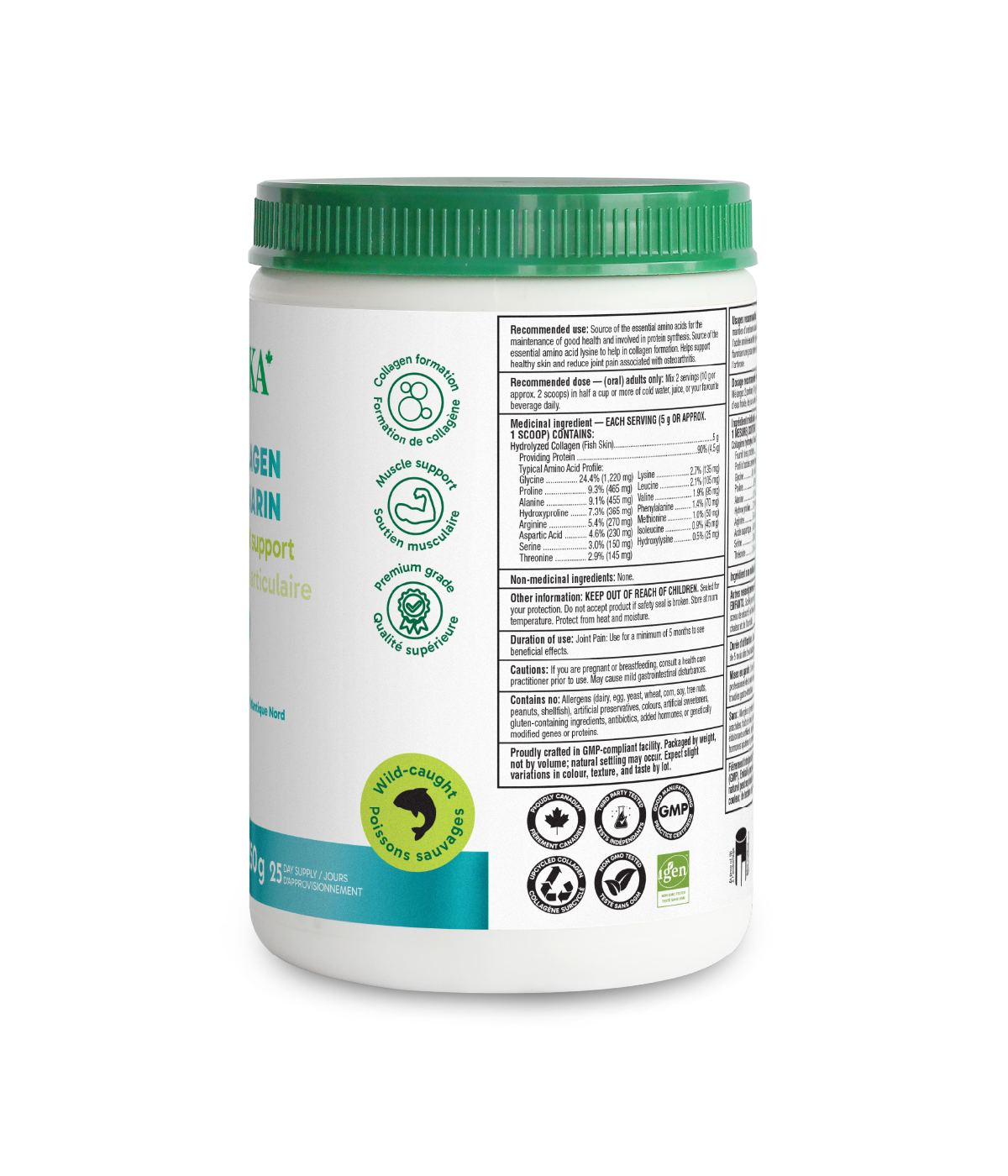
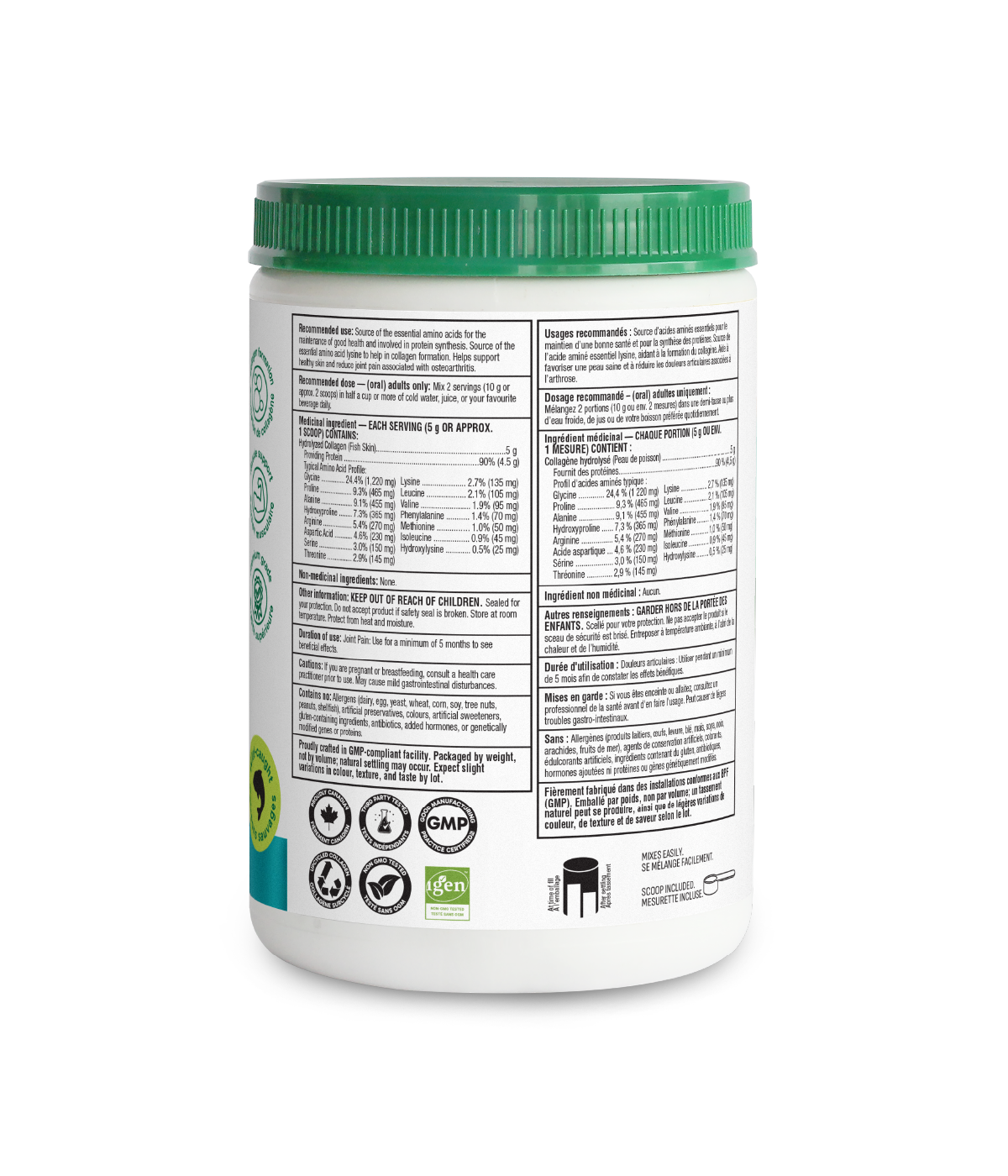
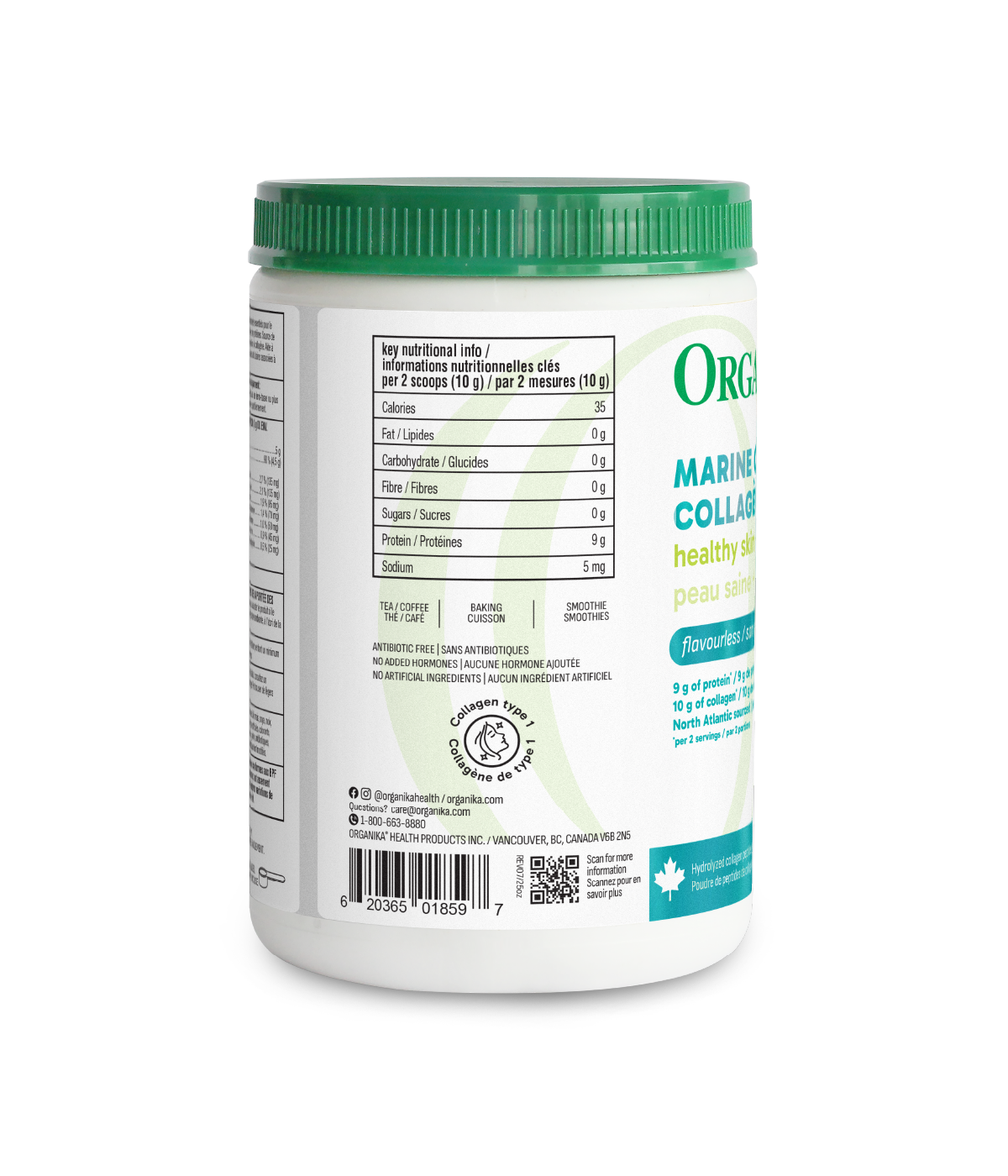
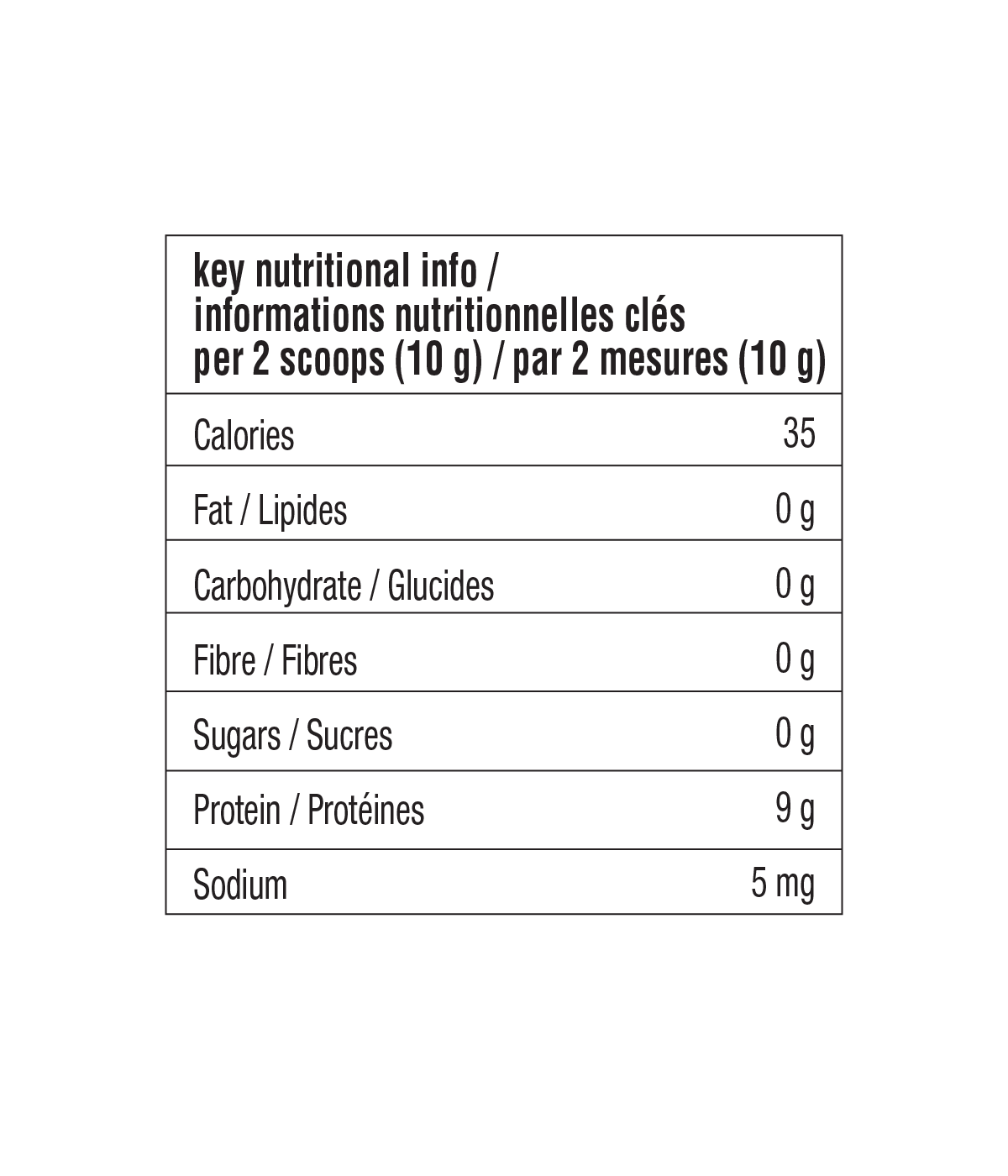
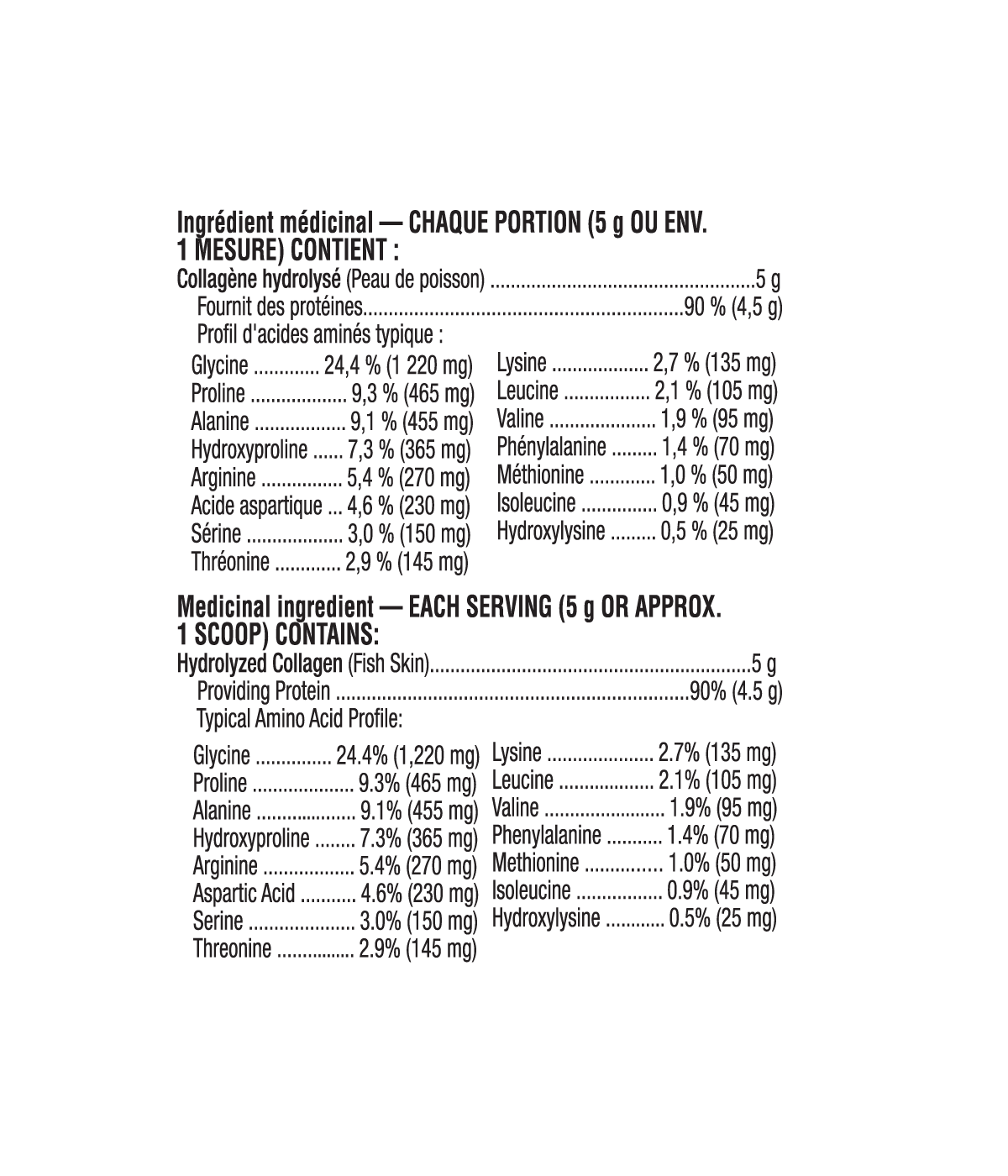







Supplement Facts







Ingredients & Nutrition
MEDICINAL INGREDIENT - EACH HEAPING TABLESPOON CONTAINS: Hydrolyzed Collagen (Fish Skin) 5 g. Amino Acid Profile: Alanine 9.1% (455 mg), Arginine 5.4% (270 mg), Aspartic Acid 4.6% (230 mg), Glycine 24.4% (1,220 mg), Hydroxylysine 0.5% (25 mg), Hydroxyproline 7.3% (365 mg), Isoleucine 0.9% (45 mg), Leucine 2.1% (105 mg), Lysine 2.7% (135 mg), Methionine 1.0% (50 mg), Phenylalanine 1.4% (70 mg), Proline 9.3% (465 mg), Protein 90% (4,500 mg), Serine 3.0% (150 mg), Threonine 2.9% (145 mg), Valine 1.9% (95 mg).
How to Use: Mix 2 heaping tablespoons (~10g) of Marine Collagen powder in half a cup or more of your favourite hot or cold beverage daily. Can also be added to smoothies, baked goods, and other recipes.
Duration of Use: Joint Pain: Use for a minimum of 5 months to see beneficial effects.
Cautions: Consult a health care practitioner prior to fish collagen powder use if you are pregnant or breastfeeding; or have liver or kidney disease or if you have been instructed to follow a low protein diet. May cause mild gastrointestinal disturbances.

Is This Right for You?
Interested in minimizing visible signs of aging?
Looking for a collagen alternative to bovine?
Looking for a collagen formulation with no antibiotics, added hormones, or GMOs?
Looking for a collagen powder that mixes easily with food and drinks?
If you answered "yes" to any of the above, this product is right for you.

-
Helps reduce joint pain linked to osteoarthritis
-
Helps maintain healthy joints
Ingredients & Nutrition
Recommend For
Interested in minimizing visible signs of aging?
Looking for a collagen alternative to bovine?
Looking for a collagen formulation with no antibiotics, added hormones, or GMOs?
Looking for a collagen powder that mixes easily with food and drinks?
If you answered "yes" to any of the above, this product is right for you.
Egg-Free
Keto Friendly
No Preservatives
Non-GMO
Sustainably sourced from wild marine life, this bovine-free collagen delivers essential support for healthy joints, radiant skin and strong hair and nails


The Full Scoop

-
Helps reduce joint pain linked to osteoarthritis
-
Helps maintain healthy joints
Our Marine Collagen Powder delivers 9 g of protein per serving and 15 essential and non-essential amino acids, including lysine which is known to promote the body's own collagen formation. Sourced from wild-caught North Atlantic cod, this formulation is a clean, ocean-based alternative to bovine collagen that helps to firm and smooth skin, strengthen hair and nails and maintain healthy joints.
Bonus: our powder doesn't have flavour and with easy mixability, it blends seamlessly into coffee, smoothies and go-to recipes.
Ask Away
We’ve got the FAQs covered. But if you’re still stuck, we’re only a message away.
Get in TouchHow much magnesium do I need?
The Canadian RDA (recommended daily allowance) of magnesium for adult males is 400-420 mg/day, and 310-320 mg/day for adult females. This can be from a combination of diet and supplements. Remember though, you may not absorb magnesium well or have higher requirements due to chronic stress. As long as your kidneys are functioning optimally, you will excrete any extra that you don't need.
The amount in the capsule of 50 mg doesn't seem like a lot of magnesium. How is this still effective?
50 mg is the amount of elemental magnesium found in each capsule, not the amount of magnesium l-threonate. This can be confusing and important to note when comparing products. Because it is easy to absorb and crosses the blood brain barrier, you can benefit from a larger percentage of the magnesium than other harder-to-absorb forms. In capsules of 50 mg, you can start slow with one capsule and work your way up to three capsules, determining your optimal dose for maximum benefit. This upper dose provides 150 mg of magnesium.
What symptoms might I have that show I need to supplement with magnesium?
Think of tension of the nervous system, mood, heart, muscles, digestion, head, uterus, etc. Low levels of magnesium have been linked to stress, anxiety and related symptoms, as well as symptoms such as muscle cramps, fatigue and irregular heartbeat. Bone loss, dental caries, kidney stones or other excess calcium symptoms can be contributed to due to low magnesium.
Organika offers magnesium in bisglycinate, citrate, and L-threonate forms. I know I need magnesium ñ which one do I need when?
When magnesium is bound to salts (like citrate), about 30-40% of the magnesium is absorbed into the body and tissues, helping our muscles and nerves relax. The rest stays in the digestive tract, where it can help ensure proper regular bowel movements. This is super beneficial for relieving constipation and can be taken daily without dependance.
Magnesium bisglycinate has over twice the absorption rate into the body of magnesium citrate. The magnesium is bound to glycine amino acids, which makes it much easier to transport across the digestive tract lining. As glycine also has calming effects, this formula does great things for promoting relaxation of the body and mind.
Magnesium L-threonate is highly absorbable, and can cross the blood brain barrier, having a greater effect on memory. It has been shown to increase short and long term memory. If the central nervous system are your weak link, Organika's Magnesium L-Threonate is the choice for you.
Don't I have to take calcium and magnesium together?
When you're feeling quite balanced and not experiencing the symptoms listed above, calcium and magnesium taken together is a great idea. It's recommended to take two parts calcium to one part magnesium, ideally along with some vitamin D and other bone supporting nutrients. On the other hand if you do see yourself in the list of symptoms above, we can actually have too much calcium relative to magnesium. This is especially the case with chronic or ongoing stress. When this stress or other magnesium deficiency symptoms are occurring, we may need to leave out the calcium and take magnesium on its own to bring these two minerals back into balance.
You'll Likely Also Love...
Liquid Marine Collagen
A liquid alternative to bovine collagen with wild-caught ingredients that smooth skin and strengthen nails.
Vegetarian Collagen
Ovoderm® Natural Eggshell Membrane is the unexpected hero that makes vegetarian collagen work
Enhanced Collagen Protein Lemon
Lemon flavoured collagen for healthier skin, hair, nails, joints, and gut
Enhanced Collagen Protein Chocolate
Healthier skin, hair, nails, joints & gut in a chocolatey drink with 0 g sugar
Support Beyond Products
Marine Collagen: Beauty from the Sea You may be seeing marine collagen or hearing about it, but unsure what the difference between that and bovine collagen is, and/or which one you should be consuming. As expected, Marine collagen comes from fish and is rich in Type 1 collagen. The collagen from this source is pescatarian-friendly for those that do not consume bovine (which also has Type 1 collagen). However, there seems to be an ongoing debate over what is the best source of collagen and why some may opt for a marine source. We are diving into all things marine collagen and answering all your questions about it. Where does marine collagen come from? As the name implies, marine collagen comes from the sea – derived from fish scales, bones, and skin. Organika's Marine Collagen powder is sourced from Canada! It comes from the scales of wild-caught cod, pollock and haddock from the North Atlantic. What is marine collagen used for? What are the known benefits? Collagen, in general, is used to help with skin health (specifically with aging skin, wrinkles), stronger hair and nails, as well as promoting joint health. Rich in Type 1 collagen, marine collagen is linked with beauty benefits and tissue repair. Some of the most popular benefits of marine collagen include: Rejuvenated skin Improved skin texture and hydration Fuller and smoother hair Stronger nails Faster-growing hair and nails Reduced cellulite Why do some people prefer marine collagen? Some may consider marine collagen a more sustainable alternative. The fishing industry often has a lot of unused raw materials from the fish they catch, including the fish skins where marine collagen comes from. In that case, marine collagen can be a more comfortable choice as it may seem to offer a more economical and environmentally friendly option for various companies. Consumers may like to see that instead of wasting fish skins, companies can use the excess materials to create other products. Is marine collagen better than bovine collagen? This is the million-dollar question consumers are asking. The truth: although they come from different sources, fundamentally, the type of collagen from both sources is the same. Collagen is a large molecule, so for it to be efficiently absorbed and utilized by the body, it must first be broken down into smaller pieces, which you may have heard of as collagen peptides. Furthermore it must go through a process known as hydrolyzation: natural enzymes break down collagen into the smaller collagen peptides, without the use of heat or chemicals. High bioavailability in a collagen supplement is assured by the size of its peptide molecules, known as the molecular weight. The smaller the molecular weight, the easier it is for collagen peptides to reach the blood stream and be effectively used in the body. Both Organika’s marine and bovine collagen go through these processes for high bioavailability and ease of digestion. The nitty gritty: marine collagen naturally boasts a lower average molecular weight than any other collagen source - Organika's weighs in at an impressively low 2-2.5 kDa, compared to an average 40-45 kDa in most bovine collagens. However, bovine collagen can have a molecular weight comparable to that of marine collagen - all it takes is more rounds of hydrolization. This is how we achieve a molecular size of under 3 kDa for our bovine-sourced Enhanced Collagen Original! So essentially, what it comes down to is personal preference and dietary restrictions. It can also be beneficial to combine a variety of collagen supplements (bovine, bone broth, marine and even poultry-sourced collagen) for optimal health. Want options for Marine collagen? There is something for everyone – whether you prefer powder, capsules, liquid, or a water enhancer – there is a collagen option for you. Marine Collagen PowderHigh in type 1 collagen, which is essential for maintaining skin, hair and nail health. Hydrolyzed for easy digestion, our marine collagen powder is also tasteless, easily mixing into beverages or foods. Salmon Collagen Capsules Convenient capsules more your thing? Try our Salmon Collagen Capsules. Because they're higher in omega-3 fatty acids, in addition to beauty health you get support with joint pain associated with osteoarthritis. Note: some people prefer salmon capsules for marine collagen because of the omega-3s that have added skin and arthritis benefits. Liquid Marine Collagen If you prefer liquid or flavoured (with orange), you must try this beauty elixir. Made with marine collagen, 200 mg Vitamin C, and 500 mcg biotin, you are getting the ultimate beauty benefits. Effervess A convenient source of marine collagen and vitamin C in a fizzy tablet that will give your water (and your skin) a makeover. Enjoy a variety of flavours: Kiwi, Cranberry, Rose, Lavender and Honey Peach The contents of this article have been fact-checked and reviewed by Registered Holistic Nutritionists.
read moreThere’s different types of collagen? Collagen has become the talk of the health industry, fitness industry as well as the beauty industry. Why? It’s an important protein. In fact, it is the most abundant protein in your body, making up 30% of your protein mass.[1] Collagen is found in our bones, connective tissues (joints, ligaments, and cartilages), muscles, hair, skin, nails and even our blood vessels. Though important for many reasons, collagen’s primary function is strength and structure. Think of it as the glue that holds your body together. Collagen peptides are what give your skin elasticity, shape, and structure in joints. Now you may understand why there are various types of collagen (16 to be exact). Regarding supplements, the most talked about types of collagen are type 1, 2, and 3. Collagen supplements come in various forms of either hydrolyzed collagen (collagen peptides, collagen powder, collagen capsules or liquid form), gelatin or undenatured collagen. Hydrolyzed collagen peptides seem to be the easiest for the body to absorb and use. Type 1 Collagen Where is it found? Type 1 collagen is found in our hair, skin and nails and is the most abundant type of collagen in our body, making up around 90%. Type 1 collagen also can be found in our bones – making up around 40% of our bone matrix as well as in our ligaments. Sources of Type 1 collagen include marine and bovine collagen. What does it do? Type 1 collagen is essential when it comes to the beauty benefits of Collagen as it is what is responsible for our skin elasticity, strength and helps with anti-aging. Cellulite is a loss of elasticity in our skin and type 1 collagen plays a significant role in that. Products with Type 1 Collagen Peptides All our Enhanced Collagen products contain Type 1 and 3 collagen, sourced from grass-fed bovine with no hormones or antibiotics Marine Collagen Powder made from fish scales containing only Type 1 collagen Liquid Marine Collagen with Biotin and Vitamin C is marine collagen in liquid form with beauty-boosting ingredients Salmon Collagen Capsules derived from the skin of wild salmon, rich in Type 1 collagen only Effervess tablets made with marine collagen and vitamin C Beef Bone Broth rich in Types 1 & 3 collagen Type 2 Collagen Where is it found? Type 2 Collagen is what we find in our connective tissues – think joints, ligaments, and cartilage. Chicken is known to have a very high amount of type 2 collagen in it. What does it do? Type 2 collagen is what is responsible for maintaining the structure of our bones and cartilage. When we have a loss of collagen in our body (it naturally decreases as we age and is affected by smoking or UV light exposure), cartilage and ligaments start to weaken and break down, leading to damage and osteoarthritis. Products with Type 2 Collagen Peptides Biocell Collagen derived from chicken cartilage (sternum) rich in type 2 collagen, with added hyaluronic acid and chondroitin sulfate for optimal joint health Chicken Bone Broth has type 2 collagen as well as essential glycosaminoglycans (GAG’s) to help with connective tissue Type 3 Collagen Where is it found? Type 3 collagen is also an abundant form of protein found in our body and found alongside type 1 collagen fibers. It is in the reticular fibers in the body. Those reticular fibers are your bones, muscles, organs, blood vessels, dentin, tendons as well as some other connective tissues. What does it do? Type 3 collagen alongside type 1 collagen is essential for improving the elasticity in our skin, anti-aging, improved circulation, healthy bone matrix, healthy nails and thicker hair. Products with Type 3 Collagen Peptides Enhanced Collagen is the #1 selling Collagen Powder in Canada* and made with grass-fed bovine, antibiotic and hormone free, offering both type 1 and 3 hydrolyzed collagen peptides. Try any of our products with Enhanced Collagen Beef Bone Broth: Excellent source of type 3 collagen! Rich in essential minerals and GAG’s known to contain Hyaluronic acid, chondroitin, and glucosamine What Types of Collagen Do You Need? Now that you know the various types of collagens, you may be wondering which one to use. 1. Let’s start with sourcing the best types to consume. Collagen (all types) is a large molecule, so start by choosing supplements that have gone through hydrolyzation. Look for hydrolyzed collagen peptides for optimal absorption. 2. Next, choose your collagen supplement based on what your health needs are, what benefits you would like to see and how each type of collagen can help your body overall. a) Are you focused on beauty and bone and joint health – you may want types 1 and 3 b) If you are only focused on joints and ligaments – you may want bone broths that are rich in Type 2 3. Third, choose the one that suits your lifestyle best. Do you prefer powder (to mix into your choice of beverages or water), capsules, or liquid? If you feel you want to supplement with all three types of collagen, that is acceptable. With collagen consumption you are also getting an intake of 17 other types of amino acids that are beneficial as well. “If you are looking for an overall collagen 1-5, combine Full Spectrum and the Vegetarian Collagen capsules. Enhanced Collagen is great because it has type 1 and 3. Type 1 for hair, skin, nails bones etc. Type 3 is great to support the gut health. I would suggest type 2 collagen for those who are looking to specifically support joints/inflammation.” Stephanie Lannon, R.H.N. and Wellness Educator Supplementing with Full Spectrum Collagen This is a plentiful form of Types 1, 2, 3 collagen and can keep muscles and tendons together and even rebuild your cartilage, helping to fight the symptoms of arthritis. “With age, collagen formation declines naturally, leading to a loss of elasticity, strength, and tone throughout the body. Organika’s Full Spectrum Collagen provides you with Bovine Collagen types 1 & 3 (giving you thick hair, strong nails, supple skin, healthy joints, as well as supporting a healthy digestive tract), Marine Collagen Type 1 (supports fuller hair, stronger nails, and youthful skin), and Chicken Bone Broth Type 2 Collagen (naturally high in hyaluronic acid and glycosaminoglycans that help build strong joints and connective tissues).” - Joleen Gruber, R.H.N. and National Educator. Want to choose collagen but are vegetarian or vegan? If you are vegan, we have a Plant-Based Collagen Booster for those wanting to simply increase their own collagen production. For vegetarians we also carry Vegetarian Collagen made from natural eggshell membranes (contains type 1 collagen and others). What Do the Experts Say About Collagen Types? Resident experts Joleen Gruber, R.H.N. & National Educator, and Stephanie Lannon, R.H.N. & Wellness Educator, weigh in on commonly asked questions about collagen, types of collagen and consuming collagen peptides. Should one be aiming for all types through their diet? Is Type 1 and 3 enough? It really depends on the desired benefits/needs. Enhanced collagen type 1 and 3 (Enhanced Collagen) is suitable for most (except for pescatarian/vegetarian/vegan or opposed to taking bovine). Once you know what you would like to get out of collagen then you can select your product. While it’s not necessary to aim for all of them, it is fine to consume all as they serve different areas of the body. What advice do you have for people that are solely marine or Type 1 collagen? Change it up and add different types of collagen to fill in the gaps (joint health, hair, skin, nails, cartilage) because as we age collagen is declining from all areas of the body. If, however, you do only want to focus on the beauty benefits and have little to no joint concerns, it is perfectly fine to go for solely Marine or Type 1 collagen (for which we have options as well). What are the products you typically recommend for someone looking for each type of collagen? The beauty of collagen is the fact it is customizable to each person’s lifestyle. Enhanced Collagen is great place to start and is Canada’s #1 collagen powder as it has type 1 and 3 and is a great collagen for those who are looking for skin, hair, nails, joints, gut support, muscles etc. There are also blends that offer added benefits; for example, better sleep (Enhanced Collagen Sleep), energy (Enhanced Collagen Vitality) etc. For pescatarians, then Marine Collagen may be best. For older adults, or if you truly want a range of collagen, they can either go with a Full Spectrum Collagen or Vegetarian Collagen capsules. Full Spectrum Collagen has type 1, 2 and 3. Vegetarian Collagen (eggshell membrane) that includes type 1,4 and 5 collagen. Both can be combined with our Full spectrum Collagen to get all 5 collagens. For busy bees, you may want to try Liquid Enhanced Collagen as taking a shot a day may be easier than finding an opportunity to make a drink or meal using the powder form. Is there a maximum amount of collagen per day that is recommended/suggested? There is no upper limit for collagen. However, usually between 2.5 g to 15 g per serving is sufficient to reap the benefits. Our body absorbs everything better if it is spread throughout the day There is not a maximum level per se, if you consume too much, your body will just burn the excess as fuel, or you may experience gastrointestinal disturbances. Note: Remember collagen is a protein (though not a full protein) and will contribute to the amount of protein getting elsewhere. Therefore, the amount you can consume may vary. If you are an athlete, then the amount of protein/collagen you can consume may be up to 25 g per day. It’s best to speak to a nutritionist to ensure you are getting a collective amount of protein that is within the suggested amount your body needs. Have more questions? Talk to our experts about product recommendations.
read morePeople across the globe are shifting towards more plants in their diets. Many are taking that one step further and eliminating animal products all together! Nearly 10% of all Canadians are following a vegetarian or vegan diet. Numbers are also rising in Europe and the US (1). With that said, how easy is it to maintain a healthy plant-based diet? The “vegan” label is commonly used as if it’s synonymous with “healthy”. We often discuss Vegan diets as if they are the magic pill for optimal health, but this is unfortunately not always true. There are some common mistakes in vegan diets, and a few important things to consider when it comes to maintaining a healthy plant-based diet. How healthy is your “health food”? What percentage of your food is coming from whole foods sources, and what percentage is processed? Processed food is not great for us for many reasons, whether it’s vegan or not. Because so many people mistakenly equate “vegan” with “healthy”, vegan processed foods are often treated differently than their conventional equivalents. This becomes especially important to consider with the advent of all the new vegan meat products: Tofurkey, Beyond Meat Burgers, plant-based chicken nuggets, etc. These meat replacement products are all highly processed, far removed from their original whole foods sources. They also contain preservatives and other chemicals that are a necessary component of the processing. These foods should all be eaten only in moderation, and should not be thought of as healthy, good sources of vegetables and other plant-based nutrients. Do I really need to worry about protein? There are a few questions to ask yourself when thinking about your protein intake, whether you’re on a vegan diet or not. 1. What are your sources of protein? Animal protein is significantly more bioavailable than plant-based protein. This means that humans can absorb much more of the protein contained in animal protein than in plant-based protein, for a variety of reasons (2). Humans can absorb almost 100% of the protein contained within animal products, and only 25-75% of the protein contained within plant-based protein (3). This doesn’t mean that plant-based protein is bad for you, but it does mean that you need to consume more of it to get the same amount of protein that animal products would provide. 2. Are you getting enough protein? The average recommendation for protein intake is a minimum of 1 g of protein per kg of body weight per day. However, the study that determined that number was using 100% animal protein. Taking into account the lower bioavailability of plant-based protein sources, that means that folks on vegan diets have an average protein requirement of 1.5 g of protein per kg of body weight per day. That number further increases if an individual is doing a lot of weight training or exercise in general, or is trying to actively heal from serious illness or injury (4). 3. Are you getting the right types of protein? Protein consumption is so vital to health because it provides the amino acids needed to build almost everything in our bodies - skin, organs, immune cells, sex cells, many of the hormones, etc. There are 20 amino acids, and nine of them are considered “essential”, which means that we must consume them in our diets in order for our bodies to function. The other 11 amino acids can be made from the essential ones by our body cells, if enough protein is available. All sources of animal protein are what we call “complete proteins”, which contain all nine of the essential amino acids. However, very few of the plant-based protein sources are complete proteins. To ensure you get all of the essential amino acids from your vegan diet: Include soy and hemp, which are both complete proteins. Regularly rotate through a variety of other plant-based protein sources, like lentils, beans, chickpeas, nuts and seeds. Combine plant-based proteins together to provide a full amino acid profile, like we commonly see in vegan protein powders. (E.g. pea, cranberry and hemp protein, etc). How will I know if I’m not getting enough? Not getting enough total protein, or not getting enough of the essential amino acids in the diet can result in protein deficiency. Protein deficiency is very common, and symptoms can include: Food cravings and binging or overeating tendencies; fatigue, anxiety or brain fog; muscle and strength loss; high blood pressure; hair loss or unhealthy hair, nails and skin; menstrual irregularities or infertility; low immunity or frequent colds and flus; slow recovery or healing time from workouts or injury. If you are experiencing any of these symptoms, get assessed by a naturopathic doctor or nutritionist to make sure you are getting enough of the nutrients your body needs. What about supplements? Even a well-balanced, whole foods-based, healthy plant-based diet will be deficient in some nutrients. This is due to some nutrients' low availability in sources other than animal products. Carefully chosen supplements are necessary to ensure optimal health on a vegan diet. Some individuals will need specific nutrients more than others. It’s important to check with your naturopathic doctor or nutritionist to determine which supplements would best serve you. The most common nutrient deficiencies in individuals on vegan diets are iron and B12. That is because they are found primarily in animal products. Also, the few plant-based sources that exist have very poor bioavailability. Blood levels of these two nutrients can be easily tested to determine what dose of supplement you require. Iron and B12 supplements should be taken ongoing. The omega 3s EPA and DHA are also a common deficiency in vegan diets, because they are found primarily in fish. Supplementation of these fatty acids should therefore be seriously considered. Other nutrients that are commonly deficient in vegan diets are zinc, calcium, riboflavin (vitamin B2) and vitamin D. The bottom line Want to save those furry little creatures, or just decrease your grocery bill, while still maintaining your health? It’s possible for most people, but it does require a little bit of extra work. But if you’re willing to put in that extra work, a healthy plant-based diet can actually be the magic diet for health that many people are looking for. Just make sure it contains a large amount of vegetables, fruits, healthy fats and plant-based protein, small amounts of processed foods, and the appropriate supplements. References Charlebois, S., Somogyi, S., Music, J. Plant-based dieting and meat attachment: protein wars and the changing Canadian consumer (preliminary results). Dalhousie University. Retrieved on Nov 5, 2019. Akande, K., Doma, U., Agu, H., Adamu, H. Major antinutrients found in plant protein sources: their effect on nutrition. (2010). Pakistan Journal of Nutrition, 9(8): 827-832. Marinangeli, C., House, J. Potential impact of the digestible indispensable amino acid score as a measure of protein quality on dietary regulations and health. (2017). Nutrition Reviews, 75(8): 658-667. Rogers, D. (2017). Vegan diets: practice advice for athletes and exercisers. Journal of International Society of Sports Nutrition, 14(36). Hoffman, J., Falvo, M. Protein - which is best? (2004) Journal of Sports Science and Medicine, 3, 118-130.
read more





